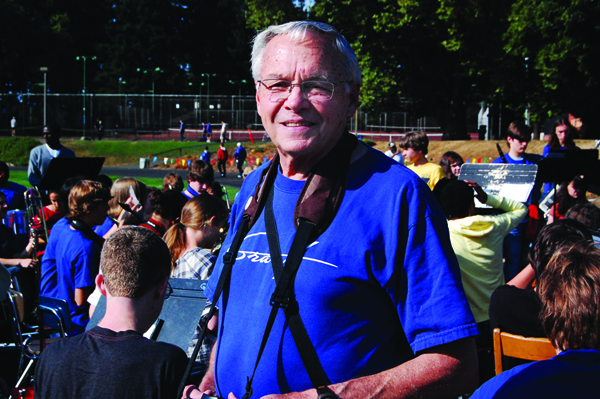A few days before starting freshman year, Hujjatt Bullock remembers waking up to a day that promised perfection. With their mom away at class, he knew as long as he and his brother, Vahid, finished the dishes the rest of the day was theirs.
As they made breakfast for their younger sister, their mom burst into the kitchen. She yelled, “Why aren’t these dishes done?” She picked up a hammer and Vahid tried to wrestle it away. Bullock turned around for just a moment. When he turned back, the hammer was lodged in his brother’s head. Half a centimeter closer and Vahid could have died
Hujjatt Bullock is now a senior at Grant. He’s moved 29 times in 17 years. He has attended six different schools, had nine separate “families” and has considered suicide twice in his life. “I was stuck in a hole,” Bullock recalls. “I wasn’t even myself.”
For the roughly 500,000 kids in foster care across the country, life is set on shuffle. For Bullock, his life has changed tracks more than most. His chances are marked. Fifty percent of foster kids in Oregon will never graduate from high school. Only 1.8 percent will receive a college degree.
His life has been a proverbial blur of emotions. As a kid, Bullock cart wheeled into the world of racism when he was called “nigger” on the playground near his fourth home in 1999. At his seventh house, he learned what two days without food felt like.
Two years later, Bullock entered into the foster care arena, which would mark his tenth home before he reached the age of 10. Living out in the country, he learned to cook, saddle horses and catch lizards. Later, he moved to Portland for the first time, learning to steal from corner stores and starting fights with other kids.
The children later were reunited with their mother, but he says she left them alone for days at a time. As boyfriends or jobs changed, so would their living situation. Bullock turned 14 in a homeless shelter in North Portland, he says, and even spent one cold winter break living in his mom’s car.
“This was where my adaptive abilities really kicked in,” he says now. “I just blended in wherever I went and every time I blended in that place would become a part of me.”
Bullock moved through a host of foster families as he made his way through Grant. No matter where he was living or who he was living with, he always went to school. He knew how important his education would be to him someday and believed he was meant for something more, something better than his situation. Despite his ability and smarts, he stumbled academically. He rarely did homework and by the end of his sophomore year, Bullock was barely holding onto a 2.0 grade-point average. He spent most of his time playing video games and living the street gang lifestyle.
“I started thinking about everything going wrong in my life,” he recalls. “This is what happens when the cycle gets too much for the potentially great.”
Halfway through his junior year, Bullock got a call from Dan Anderson, his former social studies teacher at Grant. Anderson asked Bullock if he would like to move in with him and his family. For Bullock, it would be his 29th home.
“It was the right time for Hujatt and the right time for our family,” Anderson remembers. “There were adjustments sure, but our kids were in high school and understood the importance for another human being.”
Adjusting to life at the Anderson home was a slow, but comfortable, experience. The biggest challenge for Bullock was adjusting to the normalcy of it all. Simple things like having his own room or choosing his first pet were brand new experiences for him.
Now Bullock’s life at the Anderson’s includes family car rides, Thanksgiving with something to be thankful for, Sunday mornings at church, a father figure to talk with about philosophy and learning to drive. In Bullock’s room there are photographs from both his biological family and his time with the Andersons.
Anderson says he speaks from personal experience when he stresses that the only way out of poverty is through education. For Bullock, he believes the hardest thing he will face overcoming the many “gaps in your experience” a poor childhood caused him.
For the kids growing up in foster care nationwide, the fundamental learning experiences – like reading with a parent, traveling or having high expectations — aren’t always a given.
Living with the Andersons, Bullock has filled in these gaps. He traveled to Gambier, Ohio, to attend the Kenyon College Young Writers Workshop. While there, he dabbled in poetry and music with a tight network of similarly gifted high school students.
This trip gave Bullock the ability to express his past and reflect on what he wants for his future. It was on the trip that he realized how important literacy is to the world, not just expressing yourself but understanding others’ perspectives.
“When Hujjatt came back, he had grown so much in two weeks it was phenomenal,” Anderson recalls.
Bullock’s presence at Grant also has grown. He is everywhere – performing at the Spirit of Grant Assembly, singing with the Royal Blues and striving to succeed in theater. His average GPA has risen in the past year to a 3.6.
“My eyes have been opened from living here to my full potential,” says Bullock. “I feel like I can do anything I want to and I want to be involved with everything now.”
As senior year begins, Bullock’s mentality is: “Work, work, work. No free time. Just work,” he says.
He wants a lead role in the spring musical. He’s excited by the prospects of his new band, “The Shades” with fellow classmates Karsten Topelmann and Henry Smith. But more than anything, Bullock wants to go to college. He plans to attend the University of Oregon.
For some people success is possible in spite of their past, for Bullock, his inner resilience comes because of it.
“I just want success,” he says. “If I have kids, I want them to be raised normally, with humility. I feel like I have potential to change the world and not in the small way. I have the potential to be remembered.”



































